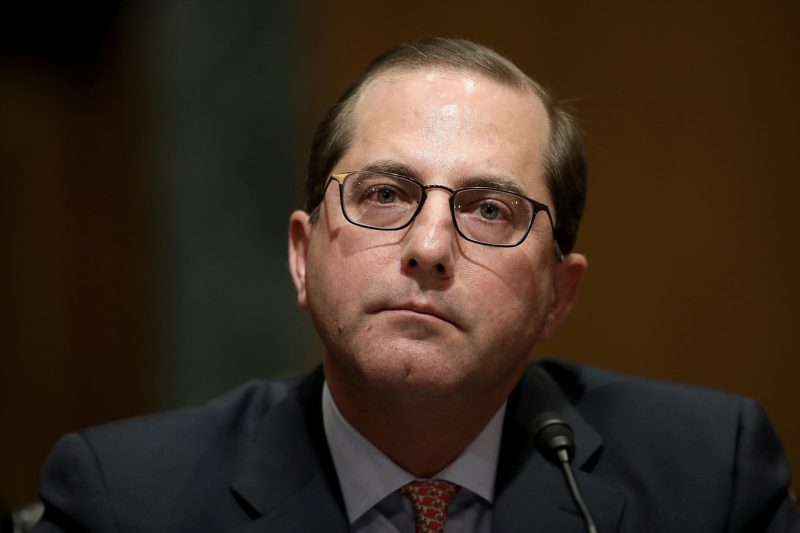Azar Confirmation Unlikely to Right Trump’s ‘Badly Off-Course’ Health Department
“We cannot tolerate one more nominee overseeing a woman’s health-care program who’s more focused on undermining that than on advancing" the program.

Alex Azar has officially taken over the U.S. Department of Health and Human Services (HHS). But the new secretary is not expected to change the Trump-era department’s agenda against reproductive health care and LGBTQ patients in need of care.
The U.S. Senate on Wednesday confirmed Azar, a former pharmaceutical industry executive, by a vote of 55-43. Six Democrats—Sens. Tom Carper (DE), Chris Coons (DE), Joe Donnelly (ID), Heidi Heitkamp (ND), Doug Jones (AL), and Joe Manchin (WV)—and Sen. Angus King (ME), an independent who caucuses with Democrats, joined all but one Republican, Sen. Rand Paul (KY), in shepherding Azar to the helm of HHS. Tom Price, the former HHS secretary who claimed “there’s not one” woman who can’t afford birth control, resigned last September after Politico revealed he had chartered private flights to the tune of $1 million in taxpayer money.
Azar is inheriting a public health agency that routinely elevates far-right extremism above public health. From the first days of the Trump administration, HHS provided a home base for anti-choice, anti-LGBTQ appointees at all levels to wield discriminatory policies. Most recently, the agency’s Office of Civil Rights established a health-care discrimination wing, complete with the dubious legal authority to embolden health-care providers who don’t want to treat LGBTQ patients or provide reproductive health care, including contraception, miscarriage management, and abortion care.
“We fear that HHS is badly off-course and doubt Mr. Azar will make the changes needed to really put patients’ interests first,” Dr. Anne Davis, consulting medical director of Physicians for Reproductive Health, said in a statement.
Azar made the case for so-called conscience protections, a form of religious imposition, in the first of two Senate confirmation hearings.
“I do believe we have to balance, of course, a woman’s choice of insurance that she would want with the conscience of employers and others,” Azar told Sen. Patty Murray (WA), the top Democrat on the Senate Health, Education, Labor, and Pensions Committee and a vocal reproductive rights advocate.
“No, we do not,” Sen. Ron Wyden (D-OR) countered in remarks he planned to deliver prior to Wednesday’s final Senate floor vote.
“A woman’s choice of health care is her choice—nobody else’s. The care she has access to and receives is not up to her employer, it’s not up to a university, it’s up to her and her doctor. And now the administration is even going after protections for LGBTQ Americans,” Wyden, the top Democrat on the Senate Finance Committee, told his fellow senators.
“Bottom line, the Trump administration is doing a lot more to protect the perpetrators of discrimination than its women and LGBTQ victims.”
Reproductive rights and health groups have raised red flags about Azar’s background and future.
Alex Azar’s anti-choice record should concern all Americans. He has said he is “committed” to “protecting the health & well-being of the unborn,” is an outspoken opponent of the ACA, & has donated $ to many anti-choice politicians. #SayNoToAzar! pic.twitter.com/Pkl5Br5bIJ
— NARAL (@NARAL) January 24, 2018
Planned Parenthood Federation of America (PPFA) issued three demands within the newly confirmed secretary’s purview. The first: Remove Scott Lloyd, an HHS appointee who weaponized his religious beliefs to deny abortion care to undocumented immigrant teenagers, including a teen who had become pregnant by rape. The second: Undo the HHS-led rollback of the birth control benefit, which widely guaranteed no-copay contraception for 62.4 million cisgender women and an untold number of transgender and gender nonconforming people.
The third: “Restore a foundation of science- and evidence-based policies.” PPFA called on Azar to reverse a purported ban on seven words—“vulnerable,” “entitlement,” “diversity,” “transgender,” “fetus,” “evidence-based” and “science-based”—across HHS offshoots; stop withholding unfavorable public comments on abortion- and transgender-related policy; and stop undermining the Teen Pregnancy Prevention Program and Title X family planning for people with low incomes. PPFA called out an HHS draft strategic plan defining life as starting at conception.
A leaked White House memo in October further revealed that HHS is promoting the so-called rhythm method over far more effective forms of birth control.
Azar’s congressional testimony gave no indication that he would take any such actions upon his confirmation. What the former George W. Bush-era HHS general counsel didn’t say often spoke louder than his carefully worded replies.
Sen. Maggie Hassan (D-NH) questioned Azar about “Jane Doe,” one of the undocumented immigrant teenagers denied her constitutional right to an abortion while in HHS custody. Azar pledged that he would “always work to ensure implementation of the Constitution and laws as currently interpreted by the courts”—courts that the Trump administration is stacking with anti-choice, anti-LGBTQ extremists.
Azar told Carper, who later voted for the secretary’s confirmation, that he supported states scrambling to codify the birth control benefit, rather than restoring it at the federal level, even though he flat-out said that geography shouldn’t determine a person’s access to care. Azar, in the same exchange with Carper, claimed ignorance on Long-Acting Reversible Contraceptives, including the intrauterine devices, or IUDs, that the top spokesperson he inherited has falsely equated with abortifacients.
“I am assuming that we provide that through Title X at HHS,” Azar said, referring to a program undermined by Trump and under attack from within. Following the dramatic departure of Teresa Manning, the former program chief who believes “contraception doesn’t work,” HHS installed abstinence-only advocate Valerie Huber.
“Unfortunately, Mr. Azar is the latest in a string of ideologically-driven health care appointees [from] President Trump,” Murray said in her Senate floor speech opposing the Azar’s confirmation.
“We cannot tolerate one more nominee overseeing a woman’s health-care program who’s more focused on undermining that than on advancing [that].”
